What Is It Like to Live Paycheck to Paycheck

Debi and Nick Lemieur stand together at their home in Havertown, Pa. Hannah Yoon for NPR hide caption
toggle caption
Hannah Yoon for NPR

Debi and Nick Lemieur stand up together at their home in Havertown, Pa.
Hannah Yoon for NPR
A business firm. Two cars. A child in higher. Debi and Nick Lemieur had all the markers of a heart class life. But they both remember one purchase — Nick's $600 bass amplifier — that prompted 1 of the biggest fights in their 4 decades of spousal relationship.
"He didn't tell me he hid it in the torso of the automobile, and I found it," Debi says, laughing, 14 years afterwards. "To me information technology was similar, oh my God, how much volition this screw with our budget?"
An unexpected bill like that is what separates millions of Americans from financial disaster. In fact, survey after survey for years has found that about people in the U.Southward. live paycheck to paycheck.
Today, amongst the pandemic, a tertiary of U.S. adults say they are having difficulty covering everyday costs such as food, rent or automobile payments. While people with the lowest incomes face the biggest challenges, even some households making higher up $200,000 are straining to pay basic expenses.
For many families, walking the tightrope of financial stress, with piffling to no savings, is hardly a pandemic-specific status. Over a yr agone, more than than a 3rd of Americans said they could not cover an unexpected $400 habitation repair or hospital nib without going into debt — or at all.
Indeed, the paycheck-to-paycheck lifestyle has long been a widespread affliction. Unmarried mothers live it. Young professionals live it. Even college professors and retired tech workers live it, like the Lemieurs from Pennsylvania. They were amongst three households that let NPR look at their monthly budgets before and during the pandemic. The budgets offer a window into how life's costs tin sometimes get out little financial wiggle room.
"What comes in goes out," says Debi Lemieur, poring over the spreadsheets with her husband, Nick — a weekly drill since the amplifier incident.
These individual stories, like anyone'south, are complex. At that place are winding career paths and unexpected wellness crises, loans and credit bill of fare debt, difficult choices and a few regrets. Merely the economic backdrop, too, has been unforgiving even for those with good incomes.
For decades, U.Southward. wages have failed to proceed stride with the ascension costs of what many perceive as essential ingredients for a successful American life: good education and wellness intendance, a domicile and a family. Student loans are a yoke around young people the minute they graduate and keep many parents from retiring. Medical bills can set people back for years, as they did for the Lemieurs. A home mortgage and utilities tin bite off half of a monthly income, specially in big cities.
A snapshot of monthly expenses cannot paint that full of a moving picture. Only information technology shows how financial strain sustains as incomes change — a tight budget ways ignoring a janky phone, while a bit more than money can mean finally upgrading — and how life's setbacks and twists tin can add together upwardly.
"I don't feel like, even if I'm saving, I'chiliad saving ... I'm ever going to get alee of annihilation," says Rhonda Alvarez, a dental assistant and mother of two teenagers in Ohio. "I experience like it'south a constant struggle, you know what I'thou maxim?"
"I shouldn't have to live paycheck to paycheck"
Rhonda calls them "little spendings." Nothing special or life-altering. New tires swiped onto a credit card. A last-minute birthday gift. Soccer cleats, shin guards and gloves for her youngest teenager.
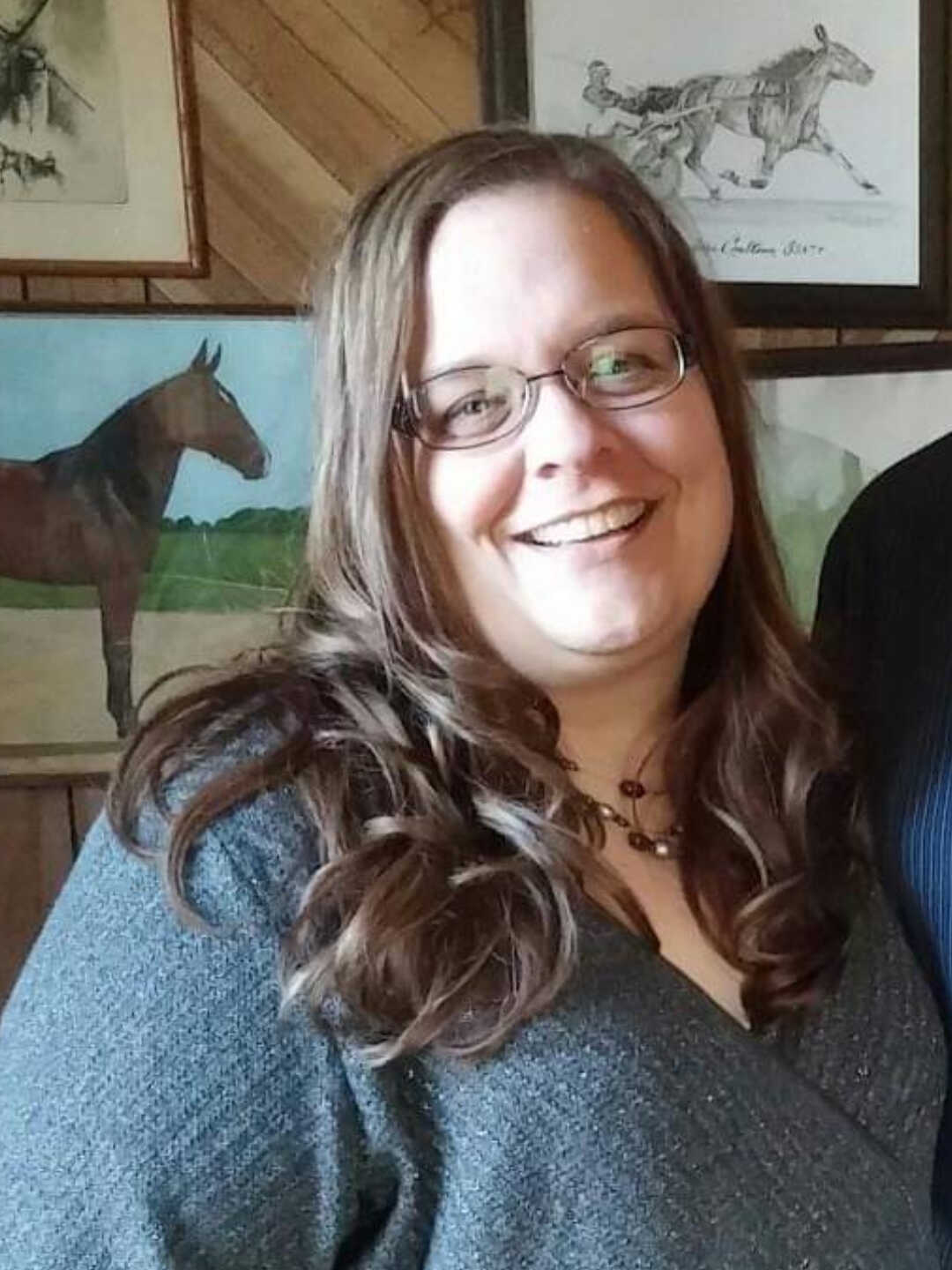
Rhonda Alvarez, a mother of 2 teenagers in Ohio, is a dental assistant trained for "expanded functions" like assisting with fillings. Rhonda Alvarez hide caption
toggle caption
Rhonda Alvarez

Rhonda Alvarez, a mother of two teenagers in Ohio, is a dental assistant trained for "expanded functions" like profitable with fillings.
Rhonda Alvarez
"You don't think about it," says the 45-yr-quondam. "Or you do later on y'all've washed it — yous're like, 'God, what did I do?' "
Debt is powerful, which is why most Americans have information technology. For Rhonda, a loan helped her notice a dental assistant career she loves both for the work and for the pay. Later on never going to the dentist until she was 18, she now geeks out learning about mucilage surgery, earning about $45,000 a twelvemonth.
A series of false starts came first. Pressure to be the first in the family to attend higher. Then culinary schoolhouse, with some other pupil loan, and food-service jobs. A marriage and a business firm. A bankruptcy and a divorce.
Debt tin also bog you lot downwards. When her personal crises piled upwardly, and the auction of the dental practice where she worked pushed her into a new job, Rhonda felt overwhelmed by her loans and bills. She cashed out her retirement savings early and paid some of them off.
All the same, she'south kept several credit cards. Y'all never know what might happen. Similar a worldwide pandemic, perhaps. Or similar losing that new job at the very kickoff of it. Rhonda has deferred her mortgage and some utilities; life trudges on despite the global crisis. A minor surgery gets scheduled. Her oldest starts driving and needs motorcar insurance. The younger ane needs that soccer gear.
"You're trying to be careful and and then you're like, this sucks," she says. "I brand decent money now, and I shouldn't have to live paycheck to paycheck."
Rhonda wishes school would teach children coin direction. "Information technology'southward fashion more important sometimes than algebra or geometry," she says. For herself, she's looked at going dorsum to train as a hygienist, too. Only information technology's another $thirty,000 in student loans — more than debt she'south not ready to take on.
"Upwards and down on a roller coaster"
While more education usually does hateful more than income over a lifetime, it's also expensive. The cost of college has more than than doubled in just 20 years, and student loans are the fastest-growing type of debt in America. Many people use this coin to larn a merchandise, similar Rhonda — or Robi Hamilton.
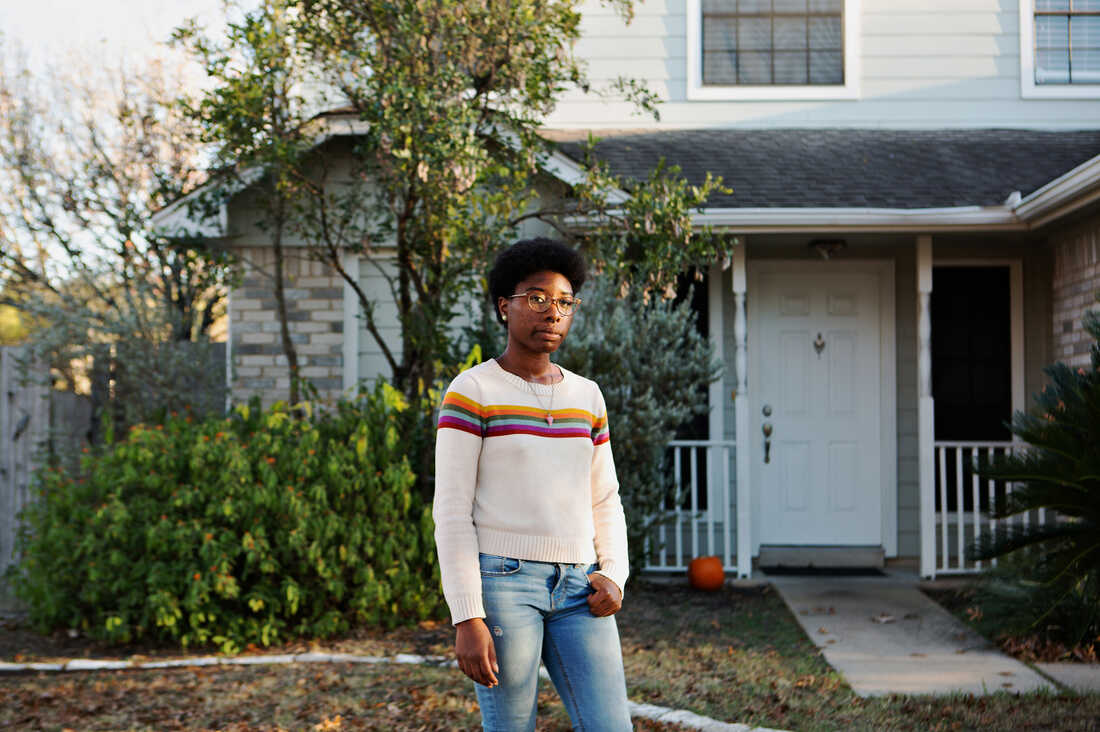
Robi Hamilton spent nearly all she had to come to Austin for massage school. She says her life "blossomed" for the offset time with full-fourth dimension massage therapy piece of work and generous tips. Mary Inhea Kang for NPR hide caption
toggle caption
Mary Inhea Kang for NPR

Robi Hamilton spent virtually all she had to come to Austin for massage school. She says her life "blossomed" for the beginning time with full-fourth dimension massage therapy work and generous tips.
Mary Inhea Kang for NPR
Robi, 28, spent virtually all her savings to get out of her home in Houston and move to Austin for massage school. Between classes, she worked at a salon around the corner, sweeping hair and doing laundry. Her boss paid for her land licensing exam as a Christmas gift, shelling out the $200 that Robi couldn't afford.
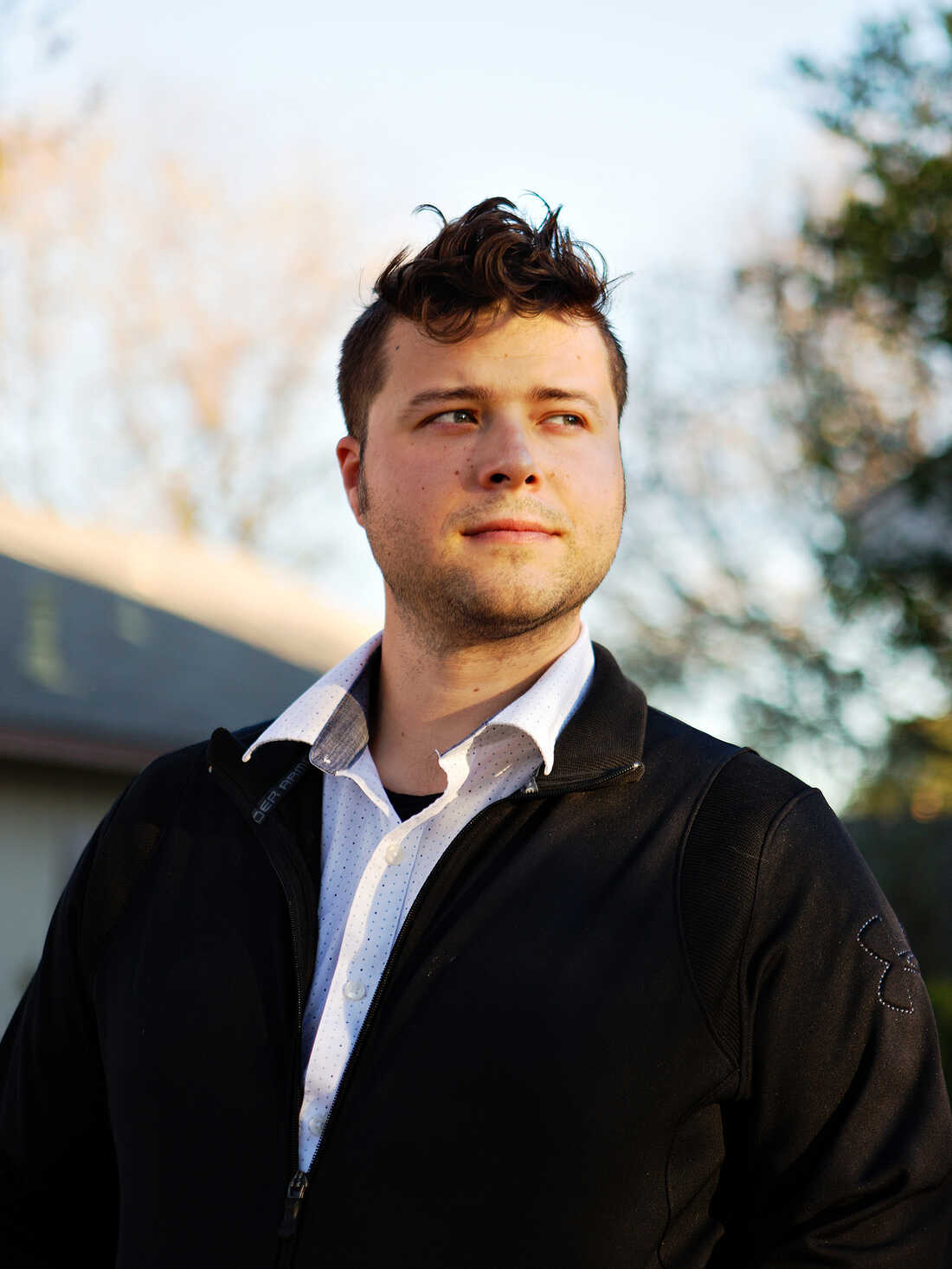
After moving to Austin, Andrew Mentzel has struggled to volume enough gigs equally an sound and video tech, which only got worse every bit the pandemic meant canceled live events. Mary Inhea Kang for NPR hide caption
toggle caption
Mary Inhea Kang for NPR

Subsequently moving to Austin, Andrew Mentzel has struggled to book enough gigs as an audio and video tech, which only got worse as the pandemic meant canceled live events.
Mary Inhea Kang for NPR
She now owes more than $ten,000 in educatee debt, but has kept it in forbearance, or on hold, "trying to go to a point where paying my student loans wouldn't actually interruption me," she says. That debt relief plus total-fourth dimension massage therapy work — $24 an hour with generous tips — had Robi feeling solid financial footing for the offset time in her life.
"I didn't know what to do with myself," she says. "When you beginning making more coin, you can upgrade your bills just a piffling bit. I got a new phone. I was like, 'This is a whole new world for me.' Nevertheless living — more than comfortably — paycheck to paycheck."
The move to Austin proved more hard for Robi'due south boyfriend Andrew Mentzel, 30. America'due south music capital lured him with the promise of lucrative opportunities for his line of piece of work in audio and video tech. Dorsum in Houston, a phone phone call or 2 had him running visuals for big oil board meetings or shepherding rock stars to concert sets. In Austin, he struggled to volume enough gigs, even after slicing his rates.
"Once the shows stopped coming in, I was completely at a loss," Andrew says, "and I take been kind of pivoting ever since."
The pandemic has undercut both of their careers. Canceled live events meant no piece of work for Andrew. Robi hasn't done much massage therapy since the leap, relying on unemployment benefits and occasional side hustles. Andrew is at present baking at a eating house for $17 an hour.
Bills are a prominent expense for the two — rent and utilities are pricey in places like Austin. The couple defray the cost past living with a roommate. They have besides spent more during the pandemic, thanks in office to the additional jobless benefits.
A new floppy-eared responsibility entered their life: a long-coat Dalmatian puppy named Libby, both the keeper of household sanity and agent of adorable chaos. Homebound life chosen for splurges at GameStop, Nintendo and Google for video games and streaming. Andrew paid off a TV he'd been financing and began a new plan for a wheel that gets him out of the business firm.
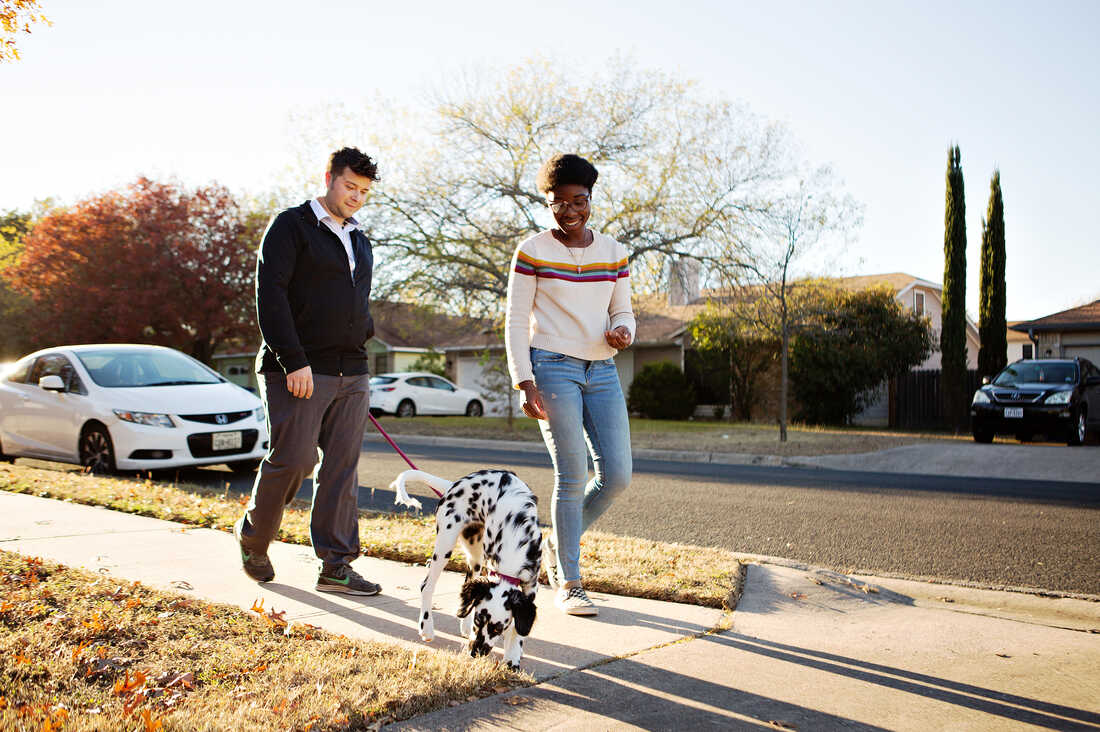
Andrew and Robi walk their puppy, Libby. The pandemic undercut both of their careers. Robi has relied on unemployment benefits since May and Andrew leaned into his work at a restaurant. Mary Inhea Kang for NPR hide caption
toggle caption
Mary Inhea Kang for NPR

Andrew and Robi walk their puppy, Libby. The pandemic undercut both of their careers. Robi has relied on unemployment benefits since May and Andrew leaned into his piece of work at a restaurant.
Mary Inhea Kang for NPR
Financially, "it feels kind of like going up and down on a roller coaster," Andrew says. "I'k able to stay above water miraculously sometimes. Simply other times, it's too shut for comfort."
"Panicky in our gut"
For the Lemieurs, later the amplifier fight, budgeting became serious business: a painstaking accounting of altogether presents and vet visits, car payments and utilities, that ran 12 pages long.
With three children, one expense or another has always popped up, but health care costs have always been the heftiest, equally for many families. In the U.S., medical issues are a major reason people file for personal bankruptcy.
The Lemieurs' medical costs weren't merely large, they were many. Their son with special needs underwent numerous therapies. They lost a girl, who died after seven years of fighting brain cancer. Debi had her own cancer battle. Nick had heart surgery.
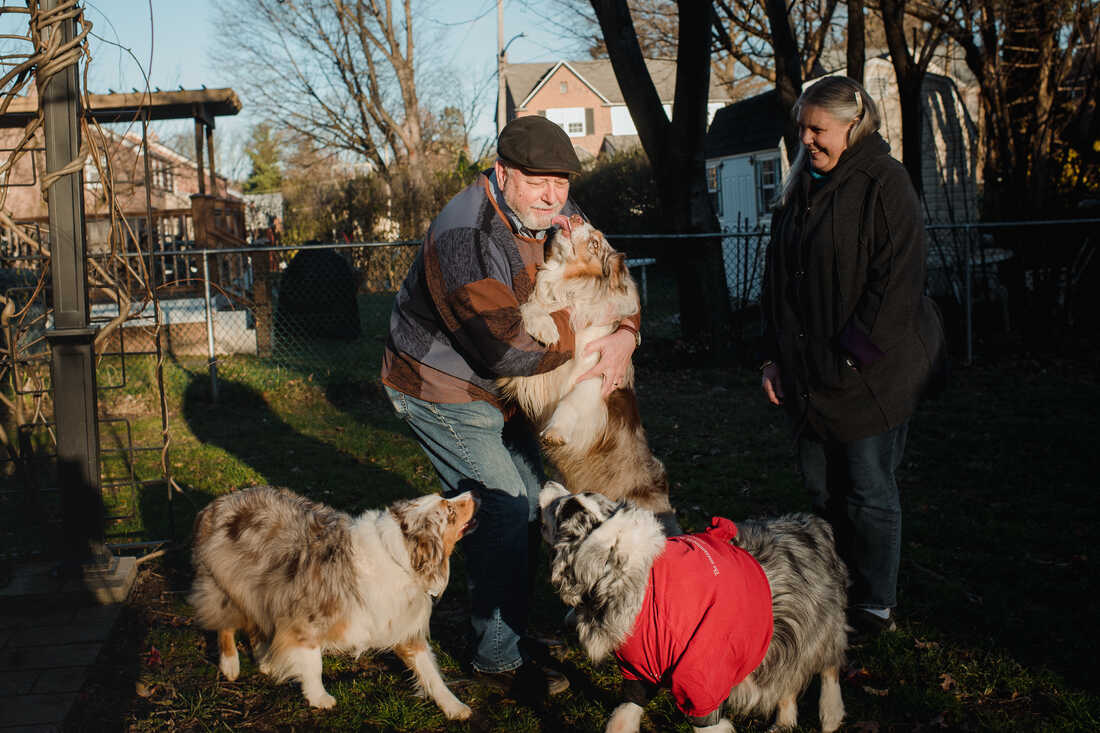
Nick and Debi Lemieur play with their dogs in their backyard. The Lemieurs instated a weekly budget review 14 years ago to account for all of their expenses. Hannah Yoon for NPR hide explanation
toggle caption
Hannah Yoon for NPR

Nick and Debi Lemieur play with their dogs in their backyard. The Lemieurs instated a weekly budget review 14 years agone to account for all of their expenses.
Hannah Yoon for NPR
"Nosotros just never had the manner to save," Debi says. To this day, wellness insurance runs almost $1,000 a month. At 64, Debi looks frontward to ditching her high-premium programme when she qualifies for Medicare.
She believes they would've done meliorate with more pedagogy. That's remarkable because she holds two master's degrees in classics, Latin and Greek. Only in academia, without a doctorate, Debi became an offshoot professor — a higher-ed gig worker — making less than $30,000 a year. She couldn't beget to finish her Ph.D. after her health problems and a funding cutting by the university.
Nick, 66, did not finish college. He fell into a solid job in tech, rising from technician to engineer managing software contracts. Then, a few years ago, his work got outsourced. Unexpectedly retired, he aced a community college form in 3D-modeling, but nobody hired him.
Nick picked up a school crossing-guard gig — to pay for the beer, he jokes — simply had to stop during the pandemic. Debi's college wages lag in the summertime and her tutoring stale up. They've deferred some bills, took their two cats off pet insurance, cutting back on museum memberships and charity donations.
Looking dorsum, Nick ponders whether their early on showtime on children was what got them into the paycheck-to-paycheck cycle. What if they'd been more than disciplined well-nigh budgets and savings earlier? Debi shakes her head. They never made enough money, she says.
"We simply would have more savings and so it wouldn't exist quite as panicky in our gut knowing that we're pulling from the savings," Debi says. "I call up we still would be living paycheck to paycheck."
Source: https://www.npr.org/2020/12/16/941292021/paycheck-to-paycheck-nation-how-life-in-america-adds-up
0 Response to "What Is It Like to Live Paycheck to Paycheck"
Post a Comment